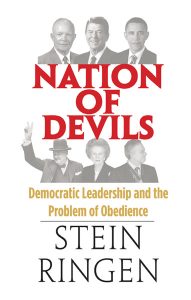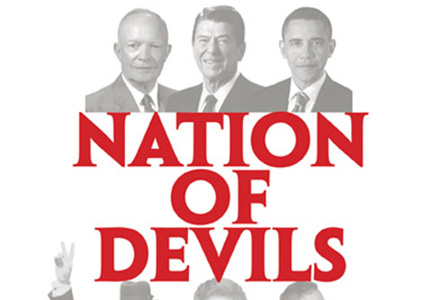Is America Still a Democracy?
Stein Ringen, author of the recently published Nation of Devils: Democratic Leadership and the Problem of Obedience, writes here on the current state of American democracy in light of the recent shutdown, financial concerns driving policy, and the possible erosion of the government into “soft despotism.” His book addresses one of the primary concerns of democratic government: how to ensure the obedience of the populace in order to govern by authority rather than power.

Stein Ringen, photo credit: Tiril Simengård Falklev
Stein Ringen—
The standard verdict over American politics is now “dysfunctional.” But the health of the system is even worse than it looks. The democratic response to political failure is to throw out the rascals. But the problems now stick deeper. They are systemic. The visible mess in Washington is symptom, not cause.
Politics is fought in two arenas. Onstage, the parties, the voters, the administration, Congress and the Supreme Court jostle over lawmaking, budgets and taxes.
Backstage, interest groups compete over ideas and to tilt public policy in favor of their particular causes. This double act is normal and the way a democracy is supposed to work.
In America, however, over the last two or three decades, there have been two tectonic shifts in power relations. First, the backstage arena has overpowered the onstage arena. Laws and budgets are obviously still decided onstage, but more than previously, much more, it is now laid down backstage what can be decided and who the decision-makers are to be. This has happened through a massive investment of money into backstage institutions: PACs, movements, think tanks and media, PR and lobbying organizations.

Second, monied interests have monopolized backstage politics. Previously, there was a balance between capital, relying on economic power, and labor, working through organizational power. Now, while organized labor has declined capital has added organizational power to its already formidable economic power.
In stead of checks-and-balances, there is gridlock and the country does not get the governing it needs. This shift has been rapid and radical and the resulting predicament is NEW.
The mechanism by which a bloated backstage arena has overpowered onstage governance, is that which the economist Arthur Okun called the “transgression” of money into the domain of politics. In the age of mega expensive politics, candidates are dependent on economic sponsors to fund permanent campaigns. This gives the providers of money the power to decide who the successful candidates will be – those they wish to fund – and what they can decide once they are in office – that which is acceptable to potential funders. Occasionally, a backstage operator will let his guard down and tell it as it is. Said Christopher Dodd when he had just become President of the Motion Picture Association of America: “Those who count on Hollywood for support need to understand that this industry is watching very carefully who’s going to stand up for it.”
American democracy has been constituted for interests to be checked against each other. That was the equality the Frenchman Alexis de Tocqueville saw when he observed the American system in the 1830s and for which he lauded it as a model for other countries. But already Tocqueville warned of a danger that America might regress towards “soft despotism:” that democratic reality erodes although democratic formality is preserved.
This is what Arthur Okun alerted was happening (in a book called Equality and Efficiency, published in 1975). When money is allowed to transgress from markets, where it belongs, to politics, where it has no business operating, those who control it gain power. Candidates have to satisfy not only voters for their votes but also givers for their money. The serious givers, i.e. the rich, get two goes at influencing politics, one as voters and one as givers. Others have only the vote, a power that diminishes as political inflation deflates its value. It is a misunderstanding to think that candidates chase money. It is money that chases candidates.
In recent political writing there has been an avalanche of critical analyses of the American system. Many critics are edging beyond warning that democratic reality might erode to concluding that it has happened. The doyen of democracy scholarship, Robert H. Dahl, the most measured of critics and the most persistent defender of American democracy, in his most recent book (On Political Equality, 2006), moves near to the edge: “Because of a decline in the direct influence of citizens over crucial government decisions, and also in the influence of their elected representatives, political inequality might reach levels at which the American political system dropped well below the threshold for democracy broadly accepted at the opening of the twenty-first century.”
How far the decline has gone is open to dispute, but the need for repair is no longer in question. A first step is to understand the nature of disrepair. It’s not about party politics. Unless the need to restore workability is confronted, the system will be dysfunctional going into the next elections and it will be dysfunctional coming out of them.
American citizens are more cynical than ever about their politicians, but that cynicism is misplaced. They should direct their justified anger against systemic dysfunctions. Political writers are more radical than ever in diagnosis, but reticent in following through to prescription. They need to move beyond complaining and get their question right: How can power be restored to where it should be, to the onstage arena?
It is historically tragic that the question, “Is America still a democracy?” is no longer rhetorical. In the absence of people power, decent representatives will continue to be deflected away from the Constitution’s intention of cooperation for, in George Washington’s words in his first inaugural, the discernment and pursuit of the public good.
Stein Ringen is emeritus professor at Oxford University and the author of Nation of Devils: Democratic Leadership and the Problem of Obedience.





America has never been a democracy, our country is and has been a constitutional republic for quite some time,,HB